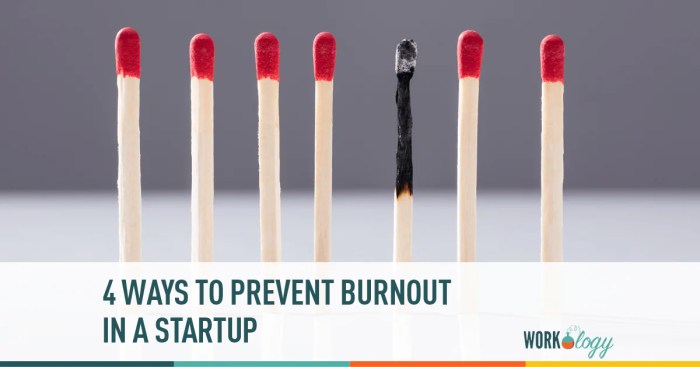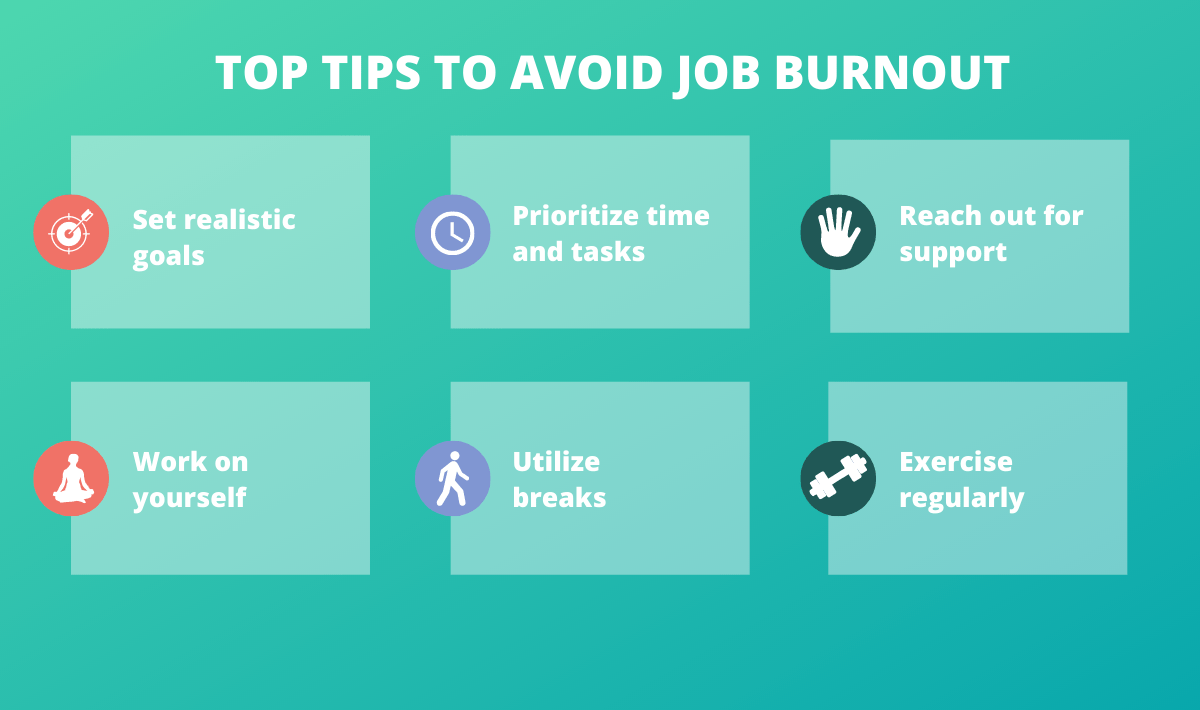How to Avoid Burnout While Running a Startup sets the stage for this enthralling narrative, offering readers a glimpse into a story that is rich in detail with casual formal language style and brimming with originality from the outset.
Understanding burnout in a startup environment is crucial for founders to navigate the challenges effectively. Recognizing early signs, implementing self-care practices, building a support system, managing time efficiently, and prioritizing tasks are key elements in maintaining a healthy work-life balance to prevent burnout.
Understanding Burnout in Startup Environment

Burnout in the context of running a startup refers to a state of emotional, physical, and mental exhaustion caused by prolonged stress, overwork, and pressure associated with building and growing a business.
Common Causes of Burnout Among Startup Founders
Startup founders are particularly susceptible to burnout due to various factors that include:
- High workloads and long hours: Startup founders often work tirelessly to meet deadlines and achieve business milestones, leading to exhaustion.
- Lack of work-life balance: The blurred boundaries between work and personal life can result in constant stress and inability to recharge.
- Financial pressures: The uncertainty of startup success and financial instability can add to the stress levels of founders.
- Isolation: Founders may feel isolated in their roles, lacking the support and camaraderie found in traditional work environments.
Impact of Burnout on Individuals and Businesses
Burnout can have detrimental effects on both individuals and businesses, such as:
- Decreased productivity and creativity: Burnout can lead to a lack of motivation and innovative thinking, hindering business growth.
- Health issues: Prolonged burnout can result in physical and mental health problems, impacting overall well-being.
- High turnover rates: Burnout may cause founders to abandon their ventures, leading to instability and potential failure of the startup.
- Negative company culture: Burnout can spread within a startup, affecting team morale and collaboration, ultimately impacting the company's success.
Recognizing Early Signs of Burnout

Recognizing the early signs of burnout is crucial for startup founders to prevent more severe consequences down the line. By identifying these signs early on, founders can take proactive steps to address their well-being and prevent burnout from escalating.
Signs and Symptoms
- Constant fatigue and exhaustion, both physically and mentally.
- Decreased motivation and enthusiasm for work tasks.
- Increased irritability and impatience with colleagues or team members.
- Difficulty in concentrating and making decisions.
- Insomnia or disrupted sleep patterns.
It's essential to pay attention to these signs as they can indicate the onset of burnout.
Manifestation in Startup Environment
- In a startup setting, founders may exhibit constant fatigue due to the demanding nature of building a company from the ground up.
- Decreased motivation can lead to a lack of drive in pursuing new opportunities or overcoming challenges.
- Increased irritability may surface during high-stress situations, impacting team dynamics and collaboration.
- Difficulty in concentrating can hinder decision-making processes critical for the growth of the startup.
- Insomnia or disrupted sleep patterns may result from the overwhelming responsibilities and pressures faced by founders.
Recognizing these signs in a startup environment is essential to maintain the well-being of founders and the success of the company.
Importance of Early Identification
- Early identification of burnout allows founders to implement necessary changes to prevent further deterioration of their mental and physical health.
- Addressing burnout early on can help maintain productivity and creativity within the startup.
- Preventing burnout from escalating can contribute to a positive work environment and sustainable growth of the company.
By recognizing the early signs of burnout, startup founders can safeguard their well-being and the success of their venture.
Implementing Self-Care Practices
Self-care practices are crucial for preventing burnout, especially in the high-stress environment of a startup. Taking care of oneself physically, mentally, and emotionally can significantly impact one's ability to navigate the challenges of entrepreneurship. It is important for startup founders to prioritize self-care to maintain their well-being and effectiveness in leading their ventures.
Setting Boundaries in a Startup Environment
Setting boundaries is essential in a startup environment to prevent overwork and burnout. Startup founders often find themselves working long hours and sacrificing personal time for the success of their ventures. By establishing clear boundaries between work and personal life, founders can protect their mental and physical health.
This can include setting specific work hours, designating time for relaxation and hobbies, and learning to say no to additional tasks when already overwhelmed.
Examples of Self-Care Routines for Startup Founders
- Regular Exercise: Physical activity can help reduce stress, improve mood, and increase energy levels. Incorporating exercise into a daily routine can have a positive impact on overall well-being.
- Mindfulness Practices: Mindfulness meditation, deep breathing exercises, or yoga can help reduce anxiety and improve focus. Taking a few minutes each day to practice mindfulness can enhance mental clarity and resilience.
- Social Connections: Maintaining relationships with friends and family members is important for emotional support. Connecting with others can provide a sense of belonging and reduce feelings of isolation common among startup founders.
- Healthy Eating Habits: Fueling the body with nutritious foods can boost energy levels and support overall health. Eating a balanced diet rich in fruits, vegetables, and whole grains can improve mood and cognitive function.
- Quality Sleep: Prioritizing adequate sleep is essential for cognitive function, mood regulation, and overall well-being. Establishing a bedtime routine and creating a restful sleep environment can promote better sleep quality.
Building a Support System
Having a strong support system is crucial for startup founders to navigate the challenges of running a business and avoid burnout. This network of individuals and resources provides emotional support, guidance, and encouragement, helping founders stay motivated and focused during tough times.
Key Individuals or Resources for Support
- Mentors: Experienced entrepreneurs or industry experts who can provide valuable advice and insights based on their own experiences.
- Co-founders: Trusted partners who share the workload and provide a sounding board for ideas and decisions.
- Friends and Family: A source of emotional support and encouragement outside of the business realm.
- Professional Support Services: Such as therapists, counselors, or coaches who can offer mental health support and guidance.
Strategies for Fostering a Supportive Environment
- Encourage Open Communication: Create a culture where team members feel comfortable sharing their struggles and seeking help when needed.
- Promote Work-Life Balance: Set boundaries and encourage employees to prioritize self-care and personal time outside of work.
- Lead by Example: Show vulnerability as a leader, admit when you need help, and encourage others to do the same.
- Offer Professional Development Opportunities: Invest in training and resources to help team members grow both personally and professionally.
Time Management and Prioritization
Effective time management and task prioritization are crucial skills when running a startup. By utilizing various techniques and tools, entrepreneurs can ensure that they stay productive and avoid burnout.
Techniques for Effective Time Management
- Utilize time blocking: Allocate specific time slots for different tasks to ensure focus and efficiency.
- Set realistic deadlines: Break down larger projects into smaller tasks with achievable deadlines to prevent feeling overwhelmed.
- Use productivity apps: Explore tools like Trello, Asana, or Todoist to help organize tasks and track progress.
Tips on Prioritizing Tasks
- Identify urgent vs. important tasks: Prioritize based on deadlines and impact on the business.
- Consider the Pareto Principle: Focus on the 20% of tasks that will yield 80% of the results.
- Delegate when necessary: Recognize when tasks can be outsourced or handled by team members to free up your time for higher-priority tasks.
Tools for Efficient Workload Management
- Time tracking software: Use tools like RescueTime or Toggl to monitor how you spend your time and identify areas for improvement.
- Project management platforms: Collaborate with team members and track project progress using platforms like Basecamp or Monday.com.
- Email management tools: Stay organized and reduce inbox clutter with tools like Boomerang or Unroll.Me.
Work-Life Balance Strategies
Work-life balance is crucial for startup founders to maintain their well-being and prevent burnout. Finding a healthy balance between work and personal life can lead to increased productivity, creativity, and overall satisfaction.
Set Boundaries
- Establish clear boundaries between work and personal time to avoid overworking.
- Define specific work hours and stick to them to ensure time for relaxation and leisure activities.
- Communicate your boundaries to team members and clients to manage expectations.
Prioritize Self-Care
- Make time for activities that promote physical and mental well-being, such as exercise, meditation, or hobbies.
- Get an adequate amount of sleep to recharge and stay focused during work hours.
- Eat nutritious meals and stay hydrated to support your overall health.
Delegate and Outsource
- Delegate tasks that can be handled by others to free up time for more critical responsibilities.
- Consider outsourcing non-core functions to professionals to alleviate your workload.
- Trust your team members and partners to handle tasks efficiently and effectively.
Schedule Breaks and Vacation Time
- Take regular breaks throughout the workday to rest and recharge your mind.
- Plan vacations or time off to disconnect from work and relax.
- Use vacation time to explore new places, spend quality time with loved ones, and rejuvenate your energy.
Closure

In conclusion, preventing burnout while running a startup requires a proactive approach that encompasses self-awareness, effective time management, and a strong support system. By prioritizing self-care and maintaining a healthy work-life balance, founders can ensure their well-being and the success of their business in the long run.
FAQ Resource
What are some common causes of burnout among startup founders?
Common causes include long working hours, high stress levels, financial pressure, and lack of work-life balance.
How can setting boundaries help prevent burnout in a startup environment?
Setting boundaries can help founders establish limits on work hours, responsibilities, and expectations, promoting a healthier work-life balance and reducing the risk of burnout.
Why is it important to have a support system as a startup founder?
A support system provides emotional, practical, and professional assistance, offering guidance, motivation, and a sense of community that can help founders navigate challenges and prevent burnout.
What tools or methods can assist in managing workload efficiently?
Tools like project management software, task lists, and scheduling apps can help founders organize tasks, prioritize effectively, and track progress to manage workload efficiently.










